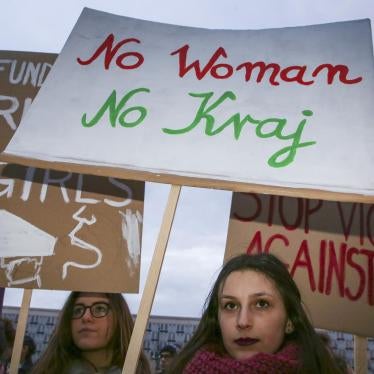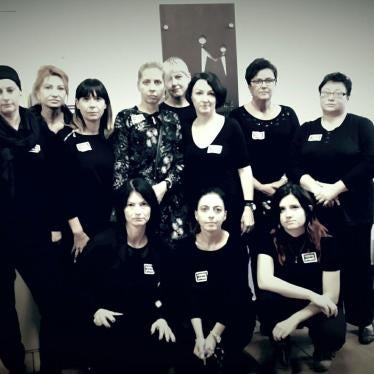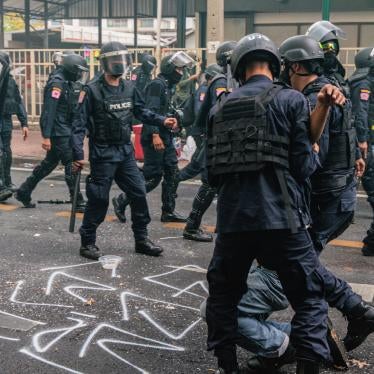(Berlin) – The arrest of a woman over a picture of a religious icon with a rainbow halo on May 6, 2019 is the latest attempt by Polish authorities to target LGBT and gender equality activists. Government officials allege the work is blasphemous and object to its presumed link to lesbian, gay, bisexual, and transgender (LGBT) rights and gender equality.
Amnesty International reported that police searched the home of Elżbieta Podlesna and arrested her following her return from a trip to Belgium and the Netherlands with the human rights organization. Police seized her laptop, mobile phone, and memory cards during the search and reportedly asked for CCTV camera footage from her building. Podlesna was held and questioned by police for several hours. No charges have been filed but police are continuing the investigation, an Amnesty International representative confirmed on May 7, and Podlesna had not regained access to her telephone or computer.
“Targeting an activist over an artwork is one more ruthless tactic by the Law and Justice party to demonize LGBT rights and gender equality,” said Hillary Margolis, a women’s rights researcher at Human Rights Watch.
Interior and Administration Minister Joachim Brudziński, a member of the ruling Law and Justice Party, announced on Twitter that police had arrested Podlesna on grounds of “profaning the image of the #Czestochowa Mother of God.” Images of the painting with a rainbow halo, often associated with LGBT activism, first appeared in late April around the town of Płock. Brudzinski referred to the act as “cultural barbarism” on Twitter.
Under Article 196 of Poland’s criminal code, a person who “offends the religious feelings of others by publicly insulting a religious object or place of worship” may face up to two years in prison.
The image of the Virgin Mary in the artwork is known as the Black Madonna of Częstochowa. Housed in Jasna Góra Monastery in southern Poland, the painting is considered a religious icon by many Catholics. Following public criticism, Brudzinski defended Podlesna’s arrest on Twitter, saying: “No fantasy about freedom and ‘tolerance’ gives ANYONE [original emphasis] the right to offend the feelings of believers.”
In July 2018, Brudzinski publicly thanked police for preventing an Equality March in Czestochowa from reaching the shrine at Jasna Góra, calling the march “an obvious cultural and religious provocation by LGBT communities.”
Podlesna is an independent activist and was one of 14 women attacked by far-right protesters after the women held up a banner reading “Stop Fascism” at an Independence Day March in Warsaw in 2017. Far-right protesters were marching with racist and fascist symbols and slogans such as “white Poland.”
A February 2019 Human Rights Watch report documented attempts by Poland’s government to roll back women’s rights since Law and Justice came to power in 2015, including through smear campaigns, public rhetoric, systematic defunding, and other forms of attack on women’s rights organizations and activists, some of whom also advocate for LGBT rights.
The government and the Catholic Church in Poland have been outspoken in censuring the concepts of “gender” and “genderism” and labeling promotion of equality as “gender ideology,” which they demonize as driving hypersexuality, homosexuality, feminism, transgenderism, and an assault on traditional marriage and families.
Under the Law and Justice Party, the anti-gender crusade has gained traction, with activists and politicians using it to galvanize support for measures that curb reproductive rights, undermine initiatives to address violence against women, hinder sexual and reproductive health education, and smear women’s rights and LGBT rights activists. In speeches and in the media, government leaders, politicians, and “anti-gender” activists propagate extremist misinformation vilifying women’s rights groups and associating them with a deterioration in “morality.”
The Law and Justice government has also fought against sexual and reproductive health education in schools, and refused environmental activists entry to Poland to attend United Nations climate talks. The party has put forward changes in the laws to undermine the independence of the judiciary and interfere with media freedom. In 2016, parliament rejected a bill that would have included gender, gender identity, sexual orientation, disability, and age as potential grounds for the crime of “hate speech.”
Overly vague laws on blasphemy, such as Poland’s, threaten freedom of speech and religion, rights protected under international human rights law, Human Rights Watch said. International rights bodies, including the United Nations Human Rights Committee and, jointly, the United Nations, Organization for Security and Cooperation in Europe (OSCE), Organization of American States (OAS), and African Commission on Human and People’s Rights (ACHPR) have said that use of blasphemy or defamation laws should be limited to protection of individual rights and should not discriminate against one group over another.
Polish authorities should return Podlesna’s property, end any investigation against her under Article 196, and cease attacks on activists who support LGBT or women’s rights, Human Rights Watch said.
“The government claims to be protecting religion and Polish values, but in reality, it is targeting its own citizens and denying their basic rights,” Margolis said. “Perpetuating the notion that gender equality and LGBT rights threaten Polish society doesn’t protect anyone – it only feeds dangerous intolerance, homophobia, and misogyny."









